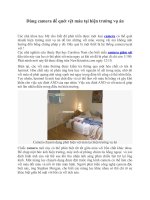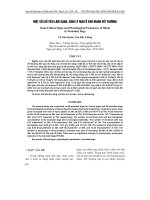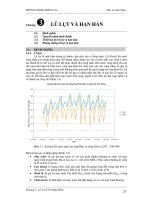Vital Ingredientde Vet docx
Bạn đang xem bản rút gọn của tài liệu. Xem và tải ngay bản đầy đủ của tài liệu tại đây (107.29 KB, 14 trang )
Vital Ingredient
de Vet, Charles V.
Published: 1952
Categorie(s): Fiction, Science Fiction, Short Stories
Source: />1
Also available on Feedbooks for de Vet:
• Delayed Action (1953)
• There is a Reaper (1953)
• Monkey On His Back (1960)
• Weels Within (1952)
• Big Stupe (1955)
Copyright: Please read the legal notice included in this e-book and/or
check the copyright status in your country.
Note: This book is brought to you by Feedbooks
Strictly for personal use, do not use this file for commercial purposes.
2
Transcriber's Note:
This etext was produced from If Worlds of Science FictionJuly 1952. Ex-
tensive research did not uncover any evidence that the U.S. copyright on
this publication was renewed. Minor spelling and typographical errors
have been corrected without note.
3
"N
OW WATCH," Remm said, indicating the native. Macker had
been absent, exploring the countryside in the immediate vicin-
ity of their landing place, and had not witnessed the capture of the nat-
ive, or the tests his two companions made on it.
Macker followed Remm's gaze to where the biped native sat hunched.
The creature was bent into an ungainly position, its body crooked at in-
congruous angles, in such a way as to allow most of its weight to rest on
a packing-box at the base of a middle angle. Its stubby feet, on the ends
of thin, pipelike legs, rested against the floor of the space ship. Its body
was covered, almost entirely, with an artificial skin material of various
colors. Some of the colors hurt Macker's eyes. In the few places where the
flesh showed through the skin was an unhealthy, pallid white.
Slowly the creature's head swiveled on its short neck until it faced
them.
"Those orifices in the upper portion of its skull are evidently organs of
sight," Remm said. "It sees that we are quite a distance away. It will
probably attempt to escape again."
Slowly—slowly—the native's head rotated away from them in a half-
circle until it faced Toolls, working over his instruments on the far side
of the room. Then it turned its head back until it faced the door of the
ship.
"It is setting itself for flight now," Remm said. "Notice the evidence of
strain on its face."
The creature leaned forward and the appendages on the ends of its up-
per limbs clutched the sides of the box as it propelled its body forward.
It raised its right foot in a slow arc, employing a double-jointed, break-
ing action of its leg. For a long moment it rested its entire weight on its
lumpy right foot, while its momentum carried its body sluggishly for-
ward. Then it repeated the motion with its left leg; then again its right.
All the while evidencing great exertion and concentration of effort.
"It is making what it considers a mad dash for freedom," Remm said.
"Probably at the ultimate speed of which it is capable. That would be ri-
diculous except that it's normal for its own environment. This is defin-
itely a slow-motion world."
The creature was a third-way to the door now. Once again its head
turned in its slow quarter-circle, to look at them. As it saw that Remm
and Macker had not moved it altered the expression on its face.
"It seems to express its emotions through facial contortions," Remm
said. "Though I suspect that the sounds it makes with the upper part of
its trachea during moments of agitation are also outlets of emotional
4
stress, rather than efforts at communication." He called across the room
to Toolls. "What did you find out about its speech?"
"Extremely primitive," Toolls replied. "Incredible as it may appear to
us it uses combinations of sounds to form word-symbols. Each word in-
dicates some action, or object; or denotes degree, time, or shades of
meaning. Other words are merely connectives. It seems to make little use
of inflections, the basis of a rational language. Thoughts which we can
project with a few sounds would take it dozens of words to express."
"Just how intelligent is it?" Macker asked.
"Only as intelligent as a high degree of self-preservation instinct
would make it."
"Are you certain that it is a member of the dominant species of life on
the planet?"
"There's no doubt about it," Toolls replied. "I've made very careful
observations."
"This attempt at escape is a pretty good example of its intelligence,"
Remm said. "This is the sixth time it has tried to escape—in exactly the
same way. As soon as it sees that we are farther away from it than it is
from the door, it makes its dash."
T
HE CREATURE was one step away from the space ship's open
portal now and bringing its foot up to cross the threshold. Remm
walked over and lifted it off the floor.
"Its legs are still moving in a running motion," Macker said. "Doesn't it
realize yet that you've picked it up?"
"Its nervous system and reflexes are evidently as slow as its motor
muscles," Remm replied. "There has not been time for the sensation of
my picking it up to reach the brain, and for the brain to send back its
message to the legs to stop their running motion."
"How heavy is it?" Macker asked.
"Only a few ounces," Remm replied. "But that's logical considering that
this is a 'light' planet. If we took it back to our own 'heavy' world, gravity
would crush it to a light film of the liquid which comprises the greater
part of its substance."
Remm set the creature down on the box in its former queerly contor-
ted position. Toolls had left his instruments and strolled over beside
them to observe the native.
"One of its appendages seems bent at a peculiar angle," Macker said.
"I noticed that," Remm answered. "I think that I may have broken the
bone in several places when I first captured it. I was not aware then of
5
how fragile it was. But now that you mention it, I should be able to use
that injury to give you a good illustration of the interplay of emotional
expressions on its face. Observe now as I touch it."
Remm reached over and touched—very lightly—the broken portion of
the native's appendage. The muscles of the creature's face pulled its flac-
cid flesh into distorted positions, bunching some and stretching others.
"It is very probably registering pain," Remm said.
Suddenly the starch seemed to leave the native's body and it slowly
slumped across the packing-box.
"Why is it doing that, Toolls?" Remm asked.
Toolls concentrated for a minute, absorbing the feelings and thought
pulsations emanating from the creature. "The conscious plane of its mind
has blanked out," he said. "I presume the pain you caused by touching its
wounded member resulted in a breakdown of its nervous system. The
only thought waves I receive now are disjointed impressions and pic-
tures following no rational series. However, I'm certain that it will be
only temporary."
"Don't you think that in justice to the creature we should repair its
wound before we free it?" Macker asked.
"I had intended to have it done," Remm replied. "You shouldn't have
any trouble fixing it, should you, Toolls?"
"No," Toolls answered. "I may as well attend to it right now." He rolled
the portable converter over beside the creature and carefully laid its arm
in the "pan." The converter automatically set its gauges and instruments
of calculation, and gave its click of "ready."
Toolls fed a short length of basic into the machine and it began its
work. The native was still unconscious.
The bone of the wounded arm slowly evaporated, beginning with the
wrist joint. The evaporated portion was instantly replaced by the manu-
factured bone of the converter. At the same time it repaired all ruptured
blood vessels and damaged ligaments and muscles.
"It was not possible, of course, for me to replace the bone with another
of the same composition as its own," Toolls said, after the machine had
completed its work. "But I gave it one of our 'heavy' ones. There will be
no force on this planet powerful enough to break it again."
T
HE NATIVE'S first evidence of a return to consciousness was a
faint fluttering of the lids that covered its organs of vision. The lids
opened and it looked up at them.
6
"Its eyesight is as slow as its muscular reactions," Remm said. "Watch."
Remm raised his hand and waved it slowly in front of the native's face.
The eyes of the native, moving in odd, jerking movements, followed the
hand's progress. Remm raised the hand—speeding its action
slightly—and the eyesight faltered and lost it. The native's eyes rolled
wildly until once again they located the hand.
Remm took three steps forward. The native's eyes were unable to fol-
low his change of position. Its gaze wandered about the room, until
again its settled on Remm's waiting figure.
"Can you imagine anything being so slow," Remm said, "and still … "
Suddenly Macker interrupted. "Something is wrong. It is trying to get
up, but it can't." The native was registering signs of distress, kicking its
legs and twisting its body into new positions of contortion.
"I see what the trouble is," Toolls said. "It's unable to lift the appendage
with the new bone in. I never thought of that before but its 'light' muscles
aren't strong enough to lift the limb. We've got the poor creature pinned
to the box by the weight of its own arm."
"We can't do that to it," Remm said. "Isn't there any way you can give
it a lighter bone?"
"None that wouldn't take a retooling of the converter," Toolls said. "I'm
not certain that I could do it, and even if I could, we don't have the time
to spare. I could give it stronger muscles in the arm, but that may throw
off the metabolism of the whole body. If it did, the result would be fatal.
I'd hate to chance it."
"I have an idea," Macker said. By the inflections of his tones the others
knew that some incongruity of the situation had aroused Macker's sense
of humor. "Why don't we give the creature an entirely new body? We
could replace the flesh and viscera, as well as the cartilaginous structure,
with our own type substance. It would probably be an indestructible be-
ing as far as its own world is concerned. And it would be as powerful as
their mightiest machines. We'd leave behind us a superman that could
change the course of this world's history. You could do it, couldn't you,
Toolls?"
"Quite simply."
"Our policy has always been not to interfere in anyway with the races
we study," Remm protested.
"But our policy has also been never to harm any of them, if at all pos-
sible to avoid it," Macker insisted. "In common justice you have to com-
plete the job Toolls began on the arm, or you're condemning this poor
thing to death."
7
"But do we have the right to loose such an unpredictable factor as it
would be among them?" Remm asked. "After all, our purpose is explora-
tion and observation, not playing the parts of gods to the primitives we
encounter."
"True, that is the rule which we have always followed in the past,"
Macker agreed, "but it is in no way a requirement. We are empowered to
use our judgment in all circumstances. And in this particular instance I
believe I can convince you that the course I suggest is the more just one."
He turned to Toolls. "Just what stage of cultural development would you
say this creature's race has attained?"
"It still retains more of an animal-like adaptation to its surroundings
than an intellectual one," Toolls replied. "Its civilization is divided into
various sized units of cooperation which it calls governments. Each unit
vies with the others for a greater share of its world's goods. That same
rivalry is carried down to the individual within the unit. Each strives for
acquisition against his neighbor.
"Further they retain many of their tribal instincts, such as gregarious-
ness, emotional rather than intellectual propagation, and worship of the
mightiest fighter. This last, however, is manifested by reverence for indi-
viduals attaining position of authority, or acquiring large amounts of
their medium of exchange, rather than by physical superiority."
"That's what I mean," Macker said. "Our policy in the past has been to
avoid tampering, only because of the fear of bringing harm. If we created
a super being among them, to act as a controlling and harmonizing force,
we'd hasten their development by thousands of years. We'd be granting
them the greatest possible boon!"
"I don't know," Remm said, obviously swayed by Macker's logic. "I'm
still hesitant about introducing a being into their midst whose thought
processes would be so subtle and superior to their own. How do you feel
about it, Toolls?"
"What would they have to lose?" Toolls asked with his penchant for
striking the core of an argument.
"The right or wrong of such moral and philosophical considerations
has always been a delicate thing to decide," Remm acquiesced reluct-
antly. "Go ahead if you think it is the right thing to do."
"A
LL FINISHED?" Macker asked.
"That depends on how much you want me to do," Toolls
replied. "I've substituted our 'heavy' substances for his entire body struc-
ture, including the brain—at the same time transferring his former
8
memory and habit impressions. That was necessary if he is to be able to
care for himself. Also I brought his muscular reaction time up to our
norm, and speeded his reflexes."
"Have you implanted any techniques which he did not possess before,
such as far-seeing, or mental insight?" Macker asked.
"No," Toolls said. "That is what I want your advice about. Just how
much should I reveal about ourselves and our background? Or should
he be left without any knowledge of us?"
"Well … " Now that the others had deferred to Macker's arguments, he
had lost much of his certainty. "Perhaps we should at least let him know
who we are, and what we have done. That would save him much alarm
and perplexity when it comes time to reorient himself. On the other
hand, perhaps we should go even farther and implant the knowledge of
some of our sciences. Then he could do a better job of advancing his
people. But maybe I'm wrong. What do you think about it, Remm?"
"My personal opinion," Remm said, "is that we can't give him much of
our science, because it would be like giving a baby a high explosive to
play with. His race is much too primitive to handle it wisely. Either he,
or someone to whom he imparts what we teach him, would be certain to
bring catastrophe to his world. And if we let him learn less, but still re-
member his contact with us, in time his race would very likely come to
regard us as gods. I would hesitate to drag in any metaphysical confu-
sion to add to the uncertainties you are already engendering. My advice
would be to wipe his mind of all memory of us. Let him explain his new
found invincibility to himself in his own way."
Macker had no criticism to offer to this suggestion. "Does he retain any
of his immunity to this world's malignant germs?" he asked.
"They are too impotent to represent any hazard to his present body
mechanism," Toolls replied. "If and when he dies, it will not be from
disease."
"He will be subject to the deterioration of old age, the same as we are,
won't he?" Macker asked.
"Of course," Toolls said, "but that's the only thing that will be able to
bring him down. He cannot be harmed by any force this 'light' world can
produce; he is impervious to sickness; and he will live indefinitely."
"Indefinitely?"
"As his world reckons time. Their normal life span is less than a hun-
dred years. Ours is over five thousand. He will probably live approxim-
ately twice that long, because he will be subjected to less stress and
strain, living as he does on a world of lighter elements."
9
"Then we have truly made a superman," Macker's tones inflected satis-
faction. "I wish we were returning this way in a thousand years or so. I'd
like to see the monumental changes he will effect."
"We may at that," Remm said, "or others of our people will. He will
probably be a living legend by then. I'd like to hear what his race has to
say about him. Do they have names with which to differentiate
individuals?"
"Yes," Toolls said. "This one has a family designation of Pollnow, and a
member designation of Orville."
"It will be necessary for us to leave in exactly ten minutes," Remm re-
minded them. "Our next stopping place—the red star—will reach its
nearest conjunction with this planet by the time we meet it out in space."
"Then we will have time to do nothing more for him before we go,"
Macker said. "But as far as I can see we've forgotten nothing, have we,
Toolls?"
"Nothing," Toolls answered. "No—we forgot nothing."
B
UT TOOLLS was wrong. They had forgotten one thing. A minor
detail, relatively… .
On Toolls' world his race, in the course of its evolution, had adjusted
itself to its own particular environment. Logically, the final result was
that they evolved into beings best able to survive in that environment.
As such their food—a "heavy," highly concentrated food—was ideally
suited to supply the needs of their "heavy," tremendously avid
organisms.
Orville Pollnow had no such food available. His body—no larger than
before—had an Earth mass of one hundred and eighty thousand pounds.
One hundred and eighty thousand pounds—the weight of twelve hun-
dred average sized men—of fiercely burning, intense virility. Even con-
tinuous eating—of his own world's food—could not supply the demands
of that body.
Twenty-four hours after the aliens left, Pollnow was dead—of
starvation.
THE END
10
Loved this book ?
Similar users also downloaded
Alexander Blade
Zero Hour
By accident Bobby discovered the rocket was about to be shot to
the Moon. Naturally he wanted to go along. But could he smuggle
himself aboard?
James Henry Schmitz
Lion Loose
The most dangerous of animals is not the biggest and fiercest—but
the one that's hardest to stop. Add intelligence to that and you
may come to a wrong conclusion as to what the worst menace is
Donald Edwin Westlake
They Also Serve
Why should people hate vultures? After all, a vulture never kills
anyone…
Kenneth Harmon
The Passenger
The classic route to a man's heart is through his stomach—and she
was just his dish.
J. B. Woodley
With a Vengeance
Keep this in mind in teaching apprentices: They are future jour-
neymen—and even masters!
Charles V. de Vet
There is a Reaper
Doctors had given him just one month to live. A month to wonder,
what comes afterward? There was one way to find out—ask a
dead man!
Charles V. de Vet
Monkey On His Back
Under the cloud of cast-off identities lay the shape of another
man was it himself?
Charles V. de Vet
Big Stupe
Smart man, Bruckner—he knew how to handle natives but they
knew even better how to deal with smart terrestrials!
Charles V. de Vet
11
Weels Within
Never ask "Who am I and where do I come from?" The answers
may not be what you'd expect!
Charles V. de Vet
Delayed Action
This planet gave him the perfect chance to commit the perfect
crime—only he couldn't remember just what it was he had
committed.
12
www.feedbooks.com
Food for the mind
13









